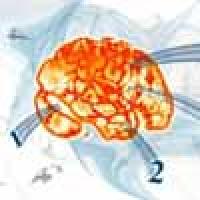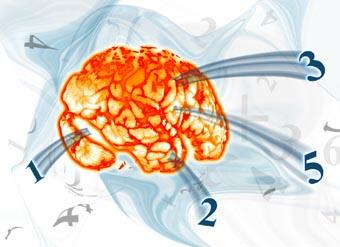
Speechless maths

Numbers on the brain.
Here you are, reading an article in a magazine about mathematics. This shows that know how to read and that you are interested in maths. But could you still do maths even if you could not make sense of sentences?
A study released by a team of researchers from the University of Sheffield shows that indeed you could - at least as far as arithmetic is concerned. Rosemary Varley, a researcher at the Department of Human Communication Sciences, tested three men whose understanding of language had been severely impaired by brain damage. She found that even though the men could not tell the difference between sentences such as "Joe kissed Jill" and "Jill kissed Joe", they could spot the difference between the mathematical expressions 5-2 and 2-5.
In another experiment, the men were unable to make sense of embedded clauses such as " the dog that is chasing the cat is black", yet they could still evaluate expressions such as $36/(2\times3)$, which depend on bracketing.
These results shed new light on one of the central questions in cognitive psychology: is language the key to human intelligence? The world presents us with an immense kaleidoscope of impressions at every moment. Yet we are able, not only to build a coherent model of the world, but also to recognise relationships of cause and effect, make predictions for the future and develop abstract concepts, such as mathematics.
Many psychologists believe that our ability to do this depends on the same skills and processes that enable us to develop language. In other words, the ability to recognise and understand phenomena in the outside world and the ability to express this understanding in language are one and the same thing. Language - or grammar, to be precise - is the "virtual scaffolding" which makes our understanding of the world superior to that of animals. The extreme end of this theory, often referred to as linguistic determinism, is represented by the controversial Sapir-Whorf hypothesis, which states that all thought is constrained by language.

A Pirahã performing a counting test. Picture courtesy of Peter Gordon
In 2004 Peter Gordon, a psychologist at Columbia University, conducted a study in order to test the relationship between arithmetic and language. He visited the Pirahã, an Amazonian tribe whose members have words only for the numbers "one" and "two". Any other number is referred to as "many". Gordon found that tribe members were unable to perform simple counting tasks as soon as numbers greater than three were involved.
Some have taken this as support for the Sapir-Whorf hypothesis: if you don't have a word for it you can't think it. There is, however, another possible interpretation of the results: the Pirahã are hunter-gatherers and in their everyday lives do not need to count or do arithmetic very much. They might simply not be used to it. In fact, in another study members of a tribe whose language has similar limitations, the Mundurukú, did just as well as a group of French individuals when asked to give approximate answers to arithmetic problems.
Where, then, do Rosemary Varley's results leave us? They prove conclusively that people can do arithmetic even when they have lost language. But this does not necessarily mean that mathematical ability is independent of language. All three men sustained their brain damage later on in life rather than at birth. It might be that mathematical ability does develop with language, but can gain direct access to the mechanisms that make it work later on.
Another interpretation comes from the psychologist Steven Pinker: he argues that underneath the language we use to communicate, there is another, more fundamental language which we use for "inner speech", and which is common to all humans. He refers to this language as "mentalese". The men in Varley's test might still be able to "speak" mentalese, even though they have lost the ability to speak English.
But maths is not just arithmetic. What about geometry and algebra, for example? Do they survive the loss of language? To answer this question Varley is currently working with a mathematician who has lost his linguistic abilities through a stroke. It is not yet clear what the results of this study will be; however, if he can still do his maths just as well as before the stroke, it will be another severe blow for the Sapir-Whorf hypothesis.
Further Reading
- Read about of Rosemary Varley's work in the University of Sheffield's press release, or in an article in the Guardian.
- The Unité de Neuroimagerie Cognitive has a very interesting survey of research done on the connections between maths and cognitive psychology.
- Read about cognitive psychology, the Sapir-Whorf hypothesis and the Pirahã on Wikipedia.
- Read about Peter Gordon's work with the Pirahã by following the link on his homepage.
- Read about maths and the brain in issue 9 and issue 19 of Plus.
Comments
Anonymous
Submitted by plusadmin on April 27, 2005 (2015 ?)
Numbers on the brain.
Numbers on the brain.
Here you are, reading an article in a magazine about mathematics. This shows that know how to read and that you are interested in maths. But could you still do maths even if you could not make sense of sentences?
what does this mean ? "This shows that (sic ?) know how to read and that you are interested in maths" ?
possibly:
"This shows that not only do you know how to read but that you are also interested in maths"
NB an inability to read is NOT equivalent to speechlessness!